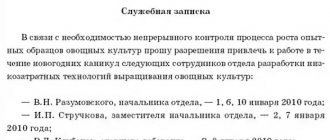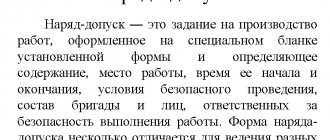What does “approved to work in fact” mean?
The law requires the employer to properly formalize the relationship that arises with the employee, that is, to sign an employment contract. Not all employers are scrupulous about legal requirements: many prefer to use the labor of employees without burdening themselves with written responsibilities. In such cases, the work agreement is concluded verbally and the employee, on behalf of the manager or his representative, begins to perform the work entrusted to him. This means that he is actually admitted to it .
IMPORTANT! From the point of view of the Labor Code, such registration of labor relations is improper.
When starting work without drawing up a document on mutual obligations, the employee does not familiarize himself with and does not sign a number of other mandatory documentation:
- inner order rules;
- employment order;
- collective agreement;
- job description;
- safety requirements, etc.
An employee who does not know his rights may think that the other party has complete control over his working hours, wages and working conditions. The Labor Code of the Russian Federation protects the weaker side of labor relations and legally equates actual admission to work to the full-fledged conclusion of an employment contract, even if it is not properly formalized.
Lines from the Labor Code of the Russian Federation
Equalization of the rights of actual admission to work and the employment contract was still in effect in Soviet labor legislation (Article 18 of the Labor Code of the RSFSR). In the Labor Code of the Russian Federation, the legal regulation of this problem is significantly expanded:
- in Art. 16 states that the proper and timely execution of an employment contract does not matter: if an employee has started work, it means that he has entered into an employment relationship with all legal consequences;
- Art. 20 defines an employee as an individual who has entered into an employment relationship with another party;
- Art. 61 specifies the moment the employment relationship comes into force - this is the day of signing the employment contract or the actual admission to work, which was authorized by the employer’s representative or simply knew about it;
- Art. 67 requires the employer to properly draw up a written employment contract with the employee who has started work within three days, and gives the employee the opportunity to reasonably demand this;
- Art. 91 indicates the terms of remuneration, in particular, that labor remuneration is accrued from the first day of work, that is, actual admission to it.
Actual admission to work without the knowledge of the employer // Review of case No. 33-6133/2019
The employee filed a lawsuit in which he asked the court to oblige the defendant to enter into an employment contract with him, to make a record of employment in the plaintiff’s work book, to collect wages for the period of forced absence, as well as compensation for moral damage.
The court found that the plaintiff was invited by the defendant to undergo an interview within two days, during which he became familiar with the defendant’s local regulations, gave consent to the processing of personal data and applied for tax deductions, and carried out a one-time task from his potential immediate supervisor. Based on the results of the interview, the employer decided that the applicant was not suitable for the vacant position.
By decision of the Petrogradsky District Court of St. Petersburg dated December 4, 2018, the stated demands were denied.
By the appeal ruling of the St. Petersburg City Court dated April 4, 2019 No. 33-6133/2019 in case No. 2-3971/2018, the decision of the court of first instance regarding the refusal to collect wages and compensation for moral damage was canceled, and the rest was left unchanged.
At the same time, the defendant was not charged wages for the entire period of the so-called. “forced absenteeism”, but only for the period of actual admission of the plaintiff to work.
Noteworthy conclusions of the appellate court:
In the case materials there is no evidence of the discriminatory nature of the refusal to hire, the conclusion of an employment contract with a specific person seeking work is the right, and not the obligation of the employer, from the explanations of the representatives of the defendant and the documents presented by them it follows that the will of the manager to hire the plaintiff is not was formed, which refutes the actual admission of the plaintiff to work with the knowledge of the manager who has the authority to hire employees; the materials of the case also do not confirm the actual admission of the plaintiff to work.
The plaintiff has not proven the fact that he was allowed to work with the knowledge of the head of the organization, or on his behalf by an authorized person.
However, these circumstances do not relieve the defendant from the obligation to pay the plaintiff for the work actually performed, which was performed in the interests of the employer.
By virtue of Art. 67.1 of the Labor Code of the Russian Federation, if an individual was actually allowed to work by an employee not authorized by the employer, and the employer or his authorized representative refuses to recognize the relationship that arose between the person actually allowed to work and this employer as labor relations ( conclude an employment contract with the person actually admitted to work), the employer in whose interests the work was performed is obliged to pay such an individual for the time actually worked (work performed).
An employee who is actually allowed to work without being authorized to do so by the employer is held accountable, including material liability, in the manner established by this Code and other federal laws.
Considering that the defendant did not provide relevant, admissible and reliable evidence confirming that the plaintiff was at the employer for the purpose of undergoing an interview for further employment, while on the indicated days the plaintiff directly carried out the labor function and performed the job duties recorded in the job description , the judicial panel comes to the conclusion that on the specified dates the plaintiff was directly allowed to work, in the absence of the consent of the authorized representative of the employer.
Taking into account the fact that the plaintiff was allowed to directly exercise his labor functions and the fact that the employer’s authorized representative did not have the consent to hire the plaintiff, the judicial panel, on the basis of the provisions of Art. 67.1 of the Labor Code of the Russian Federation came to the conclusion that it was necessary to recover money from the defendant in favor of the plaintiff for the time actually worked (work performed).
Sergey Isanov
I'm on social networks:
LinkedIn: linkedin.com/in/isanov;
Instagram: instagram.com/isanov.legal;
Telegram: https://t.me/isanov_legal;
Twitter: @isanov_legal
Employment contract = actual admission
The legal equality of these two methods of starting an employment relationship lies in their legal consequences. It is considered that an employee who has started work has already concluded an employment contract orally, and its written execution cannot be delayed for a period exceeding three working days.
Will an employment contract drawn up with such a delay be somehow different from a standard one? Differences:
- Difference in dates. The contract is not signed “retroactively”, therefore, it will have a date later than the one when the employee actually started work (the start date of work is indicated separately in the text of the contract).
- The nuance of entry into force. This agreement will come into force from the day of admission to work, and not from the moment of conclusion, as is usually the case.
Thus, actual admission to work is not an exemption from drawing up an employment contract, but only a small delay, a permissible exception to the general rule of employment, when the contract is first signed, and then the employee starts work.
Newsletter of the magazine "Personnel Department"
Article 25 of the Labor Code of the Republic of Belarus stipulates that the beginning of the employment contract is the day the work begins, determined by the parties therein, by the Labor Code.
The actual admission of the employee to work is the beginning of the employment contract, regardless of whether the hiring was properly formalized. Based on the actual admission of the employee to work, labor relations arise between the employee and the employer. In this case, the fact that the employment contract was not properly drawn up does not matter for the emergence of legal relations. Thus, the obligation to formalize an employment contract in writing does not preclude the commencement of its validity without this very form.
For information
Before the adoption of the Labor Code, Art. 18 of the Labor Code provided for the conclusion of an employment contract “orally or in writing.”
That is, in this case, an oral agreement upon its subsequent execution according to the rules of Art. 18 of the Labor Code smoothly flows into a written contract, but the beginning of the employment contract in this case will be the date from which the employee began work - from which the labor legal relationship actually arose, and not the date of conclusion of the contract in writing.
It is obvious that this norm was introduced into the Labor Code with the aim of additional protection of the employee’s labor rights and the possible establishment of additional guarantees for the employee on an individual basis compared to the legislation.
However, the actual admission of an employee to work and the emergence of labor relations between the parties on this basis does not mean that an employment contract and other necessary documents need not be drawn up.
If the employer fails to draw up an employment contract and all the necessary documents, the employee will be able to protect his rights based on the provisions of Art. 25 of the Labor Code and resolution of the Plenum of the Supreme Court of March 29, 2001 No. 2[1].
we quote the law
Clause 7 of resolution No. 2:
An employment contract is concluded in writing. At the same time, by virtue of Art. 25 of the Labor Code, the actual admission of an employee to work by an official of the employer authorized to hire is also the conclusion of an employment contract.
Hiring, both on the basis of a written employment contract, and in the case of actual admission to work (no later than three days after the presentation of the request by the employee or trade union), is formalized by order (instruction) of the employer.
If the employer refuses to properly formalize the hiring process and subsequently prevents the employee from working, the latter has the right to file a claim in court to reinstate him at work and force the employer to properly formalize the hiring process.
[1] Resolution of the Plenum of the Supreme Court of the Republic of Belarus dated March 29, 2001 No. 2 “On some issues of the application of labor legislation by courts” with subsequent amendments (hereinafter referred to as Resolution No. 2).
How is actual permission to work obtained?
The law does not provide regulations according to which the employer secures the employee’s right to begin work on his instructions and with his knowledge. This procedure can be prescribed in the internal regulations of the organization. It could be:
- oral agreement;
- the employee writing an application for permission to work;
- order or order for admission;
- an official (report) note recording the fact of starting work at a new workplace.
It is of fundamental importance that only a representative of the employer vested with these powers can be allowed to work. These powers must be specified in local acts or constituent documents of the organization.
NOTE! In practice, workers, when starting work, cannot check whether the person who authorized them has such authority. Therefore, a rule has been adopted according to which in the courts such doubts are interpreted in favor of the employee, unless the employer proves that he purposefully familiarized the applicant with the authority or lack thereof.
Who has the right to actually authorize an individual to work?
In Art. 67.1 of the Labor Code of the Russian Federation refers to an authorized representative of the employer. Who such a representative is is stated in paragraph 12 of the Resolution of the Plenum of the Supreme Court of the Russian Federation dated March 17, 2004 No. 2 “On the application by the courts of the Russian Federation of the Labor Code of the Russian Federation.” In particular, it states that the representative of the employer is a person who, in accordance with the law, other regulatory legal acts, constituent documents of the organization or LNA, or by virtue of an employment contract concluded with this person, is vested with the authority to hire employees , since it is in this case that in actual By allowing an employee to work with the knowledge or on behalf of such a person, an employment relationship arises (Article 16 of the Labor Code of the Russian Federation) and the employer may be obligated to formalize an employment contract with this employee in a proper manner.
Please note: unauthorized company employees can also actually allow individuals to work, but this does not make them authorized representatives. And authorized persons may not agree with such a decision, but the employer is obliged to pay for the work in any case.
Thus, the main characteristic of an authorized representative of the employer is the presence of documented authority to make personnel decisions. Therefore, such a person can be both the general director and a human resources specialist - each at his own level and in accordance with the powers granted.
Evidence of actual permission to work
If the employer has not recorded in any way the moment of admission of the new employee, how can this be proven if it is necessary to protect their rights?
First, after three days, you should request a written document on the employment relationship. If the employer does not do this, he falls under administrative liability.
Evidence of labor relations in court can include:
- pass to the territory of the organization;
- providing the employee with a workplace;
- acts on receipt of stationery, materials, workwear, etc.;
- document confirming a medical examination;
- employee's name in plans, programs, lists, etc.;
- audio or video recordings where the employer’s representative gives instructions to the employee, and the employee performs the work;
- witness statements;
- an agreement on material liability (sometimes concluded “bypassing” the labor agreement, where there is interaction with certain values);
- other evidence.
How to reflect the process of actual admission to work in the LNA
As for the local regulatory act itself, which reflects this process , there are several ways to proceed.
- Describe the procedure for actual admission to work in a separate LNA. This makes sense in a situation where the establishment of an employment relationship through actual admission to work is a common practice in the company's activities. For example , urgent hiring of additional loaders to perform a predetermined amount of work.
- Reflect this process in an existing LNA. As a rule, every company has an LNA dedicated to the procedure for hiring and dismissing personnel (for example, internal labor regulations, which every company must have). It is possible to introduce a chapter devoted to cases of actual admission of individuals to work.
- Add rules on actual admission to work to several thematic LNAs (provisions on the reception of personnel, on the access regime, on the personnel service, etc.). This option is not very convenient, but it is suitable for those cases when the rules on the procedure for hiring personnel are divided into several LNAs. This method will allow you not to disrupt the existing LNA structure at the enterprise.
Actual admission and probationary period
Can we talk about entrance examinations if it is required to start work so urgently that it is not possible to first draw up an employment contract, where all the conditions of the probationary period are usually prescribed? Usually not. Actual admission to work, as if by default, fixes the suitability of the employee accepted in this way.
However, by agreement of the parties, entrance examinations can be completed before the conclusion of an employment contract. To do this, you will have to spend time and effort signing a separate agreement on this issue, as required by Part 2 of Art. 70 Labor Code of the Russian Federation. Only in this case can it be transferred to the employment contract. It must be executed in 2 copies - for each party.
If such an agreement has not been drawn up, the employer does not have the right to establish a probationary period upon subsequent execution of the employment contract.
Consequences of admission to work after the fact
If, within the three-day period provided for by law, the employer has properly formalized the resulting employment relationship, no additional legal consequences arise. It’s just that a new employee has appeared on his staff, another representative of the staff. Consequences occur if the employee’s rights are violated by improper performance of the employer’s duties:
- If permission to work was obtained from a person who did not have such authority, and the employer refuses to hire him in the proper manner, he is obliged to pay the failed employee remuneration for the work performed in proportion to the time actually worked. The guilty employee who has exceeded his authority is subject to disciplinary action. If, as a result of this admission, real damage occurred, it will be recovered from the employee, but financial liability will also fall on the unauthorized representative (Article 39 of the Labor Code of the Russian Federation).
- If the employer has not drawn up a written employment contract within the three-day period established by law, the employee has the right to demand this. If the employer refuses, you can seek rights through court or the labor inspectorate. For violating the law, the employer faces a serious fine, the amount of which may vary depending on the type of violation:
- evasion of registration;
- untimely registration;
- improper registration;
- replacement of an employment contract with a civil law one.
- There is no employee signature on the employment contract. Such an agreement is considered to be executed improperly, for which the employer is responsible. This does not exempt him from labor relations, which are still considered concluded upon admission to work.









